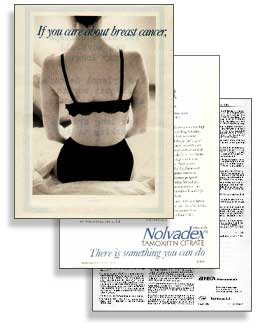|
New Zeneca Ad Campaign
Misleading to Women Women concerned about breast cancer are being bombarded with a massive advertising campaign for the drug tamoxifen by Nora Cody Oakland, California This article is part of a series of commentaries by Nora Cody, First Do No Harm: A Consumer Health Advocate's Cautionary Tales, which examines issues in health and medical research, with a special focus on women's health topics. Introduction
The drug is tamoxifen, a drug that until recently was given to prevent recurrence in the second breast to a woman who had suffered breast cancer in one breast. It has been shown to be highly effective as a preventive when used by these women. Last spring the FDA approved tamoxifen (which goes by the brand name Nolvadex) for use as a preventive in healthy women with no history of breast cancer but deemed to be at high risk for developing the disease. It became the only drug approved in the U.S. to lower the incidence of any form of cancer, and potentially highly lucrative for its manufacturer Zeneca Pharmaceuticals. Now Zeneca has launched a major ad campaign that urges women to find their "risk factor” number. The ads, however, have serious problems. What follows is a press release describing the objections voiced by this coalition of women's health organizations. For more information contact the National Women’s Health Network at 202-347-1140. |
||||||||||||
| Zeneca's tamoxifen (Nolvadex®) ads
To: Members of the Media From: Breast Cancer Action, DES Action, Boston Women's Health Book Collective, National Women’s Health Network, Massachusetts Breast Cancer Coalition. Zeneca Pharmaceuticals and the company's European marketing partner, Hoffman-LaRoche, have developed print and television ads that encourage women to find out more about how they can "prevent" breast cancer. These ads have been made possible by the FDA's relaxation of restrictions against direct marketing of pharmaceuticals. They are the first salvo in what will almost certainly soon be a major campaign to get healthy women to buy drugs that have potentially life-threatening side-effects. The television ad gives a decidedly one-sided view o£ tamoxifen, but it does so in a context that will have strong appeal for women concerned about breast cancer. The ad uses images of apparently healthy women of a variety of races and ages, all of whom share a concern about breast cancer. The women make statements reflecting commonly held but inaccurate “facts" about breast cancer that are then ”corrected" by large graphics. The misstatements that are corrected by the graphics are that
After the graphics correct the “facts", a voice tells women they can find out what their risk really is. The women respond by wondering why they should want to know, since there is nothing they can do about it anyway. The voice then gives women the good news that there is something they can do, and that their doctors know about. It encourages women to call a toll free number (800-528-7852) to get more information. The Zeneca advertisements are remarkable both for what they do and don't communicate. The ads are so benign that our organizations have received calls from women who saw them and wanted to get the toll free number from us because they thought they would get information about diet and exercise. The ads are misleading and dangerous for several reasons:
The FDA has already required the company to pull both its print advertisements and the informational brochure that it has been distributing at breast cancer conferences. The FDA has so far declined to act against Zeneca’s television advertisements because the ads do not mention tamoxifen by name. The reasons for the FDA’s action in requiring Zeneca to pull their print ads are explained in detail in the accompanying letter. As women’s health activists, we are working to assure that women and men receive accurate, balanced information about tamoxifen and other drugs touted as “preventing” breast cancer or reducing risk of developing the disease. Appendix -- Letter from the Department of Health & Human Resources Food and Drug Administration to Zeneca Pharmaceuticals. |
||||||||||||
| Published in In Motion Magazine May 5, 1999. |
||||||||||||
If you have any thoughts on this or would like to contribute to an ongoing discussion in the  What is New? || Affirmative Action || Art Changes || Autonomy: Chiapas - California || Community Images || Education Rights || E-mail, Opinions and Discussion || En español || Essays from Ireland || Global Eyes || Healthcare || Human Rights/Civil Rights || Piri Thomas || Photo of the Week || QA: Interviews || Region || Rural America || Search || Donate || To be notified of new articles || Survey || In Motion Magazine's Store || In Motion Magazine Staff || In Unity Book of Photos || Links Around The World NPC Productions Copyright © 1995-2020 NPC Productions as a compilation. All Rights Reserved. |
||||||||||||


